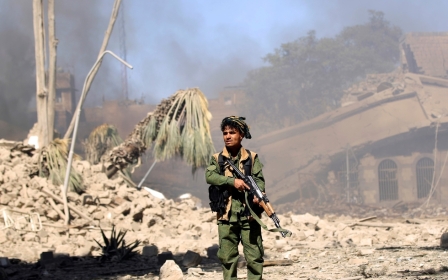Yemen's women bear the brunt of war. Their demand for peace must be heard

It is both saddening and fortunate how the reports of Saudi journalist Jamal Khashoggi’s tragic death last month brought an overdue and critical attention to an often conveniently forgotten war – the one ravaging my country, Yemen.
With the brutal conflict well into its fourth year, we must now ensure it translates into concrete progress for the Yemeni people. We, Yemeni women, have been working in solidarity to chart the way forward towards peace, but we are in dire need of international support.
The world’s worst humanitarian crisis
With recent calls for a ceasefire and an immediate resumption of the UN-led Yemeni political process, we cannot lose sight of what is at stake.
The conflict has made Yemen home to the world’s worst man-made humanitarian crisis. Just last week, the United Nations humanitarian chief Mark Lowcock warned that up to 14 million – half the population – could soon face famine. In one part of Yemen, residents are forced to subsist on leaves off trees.
Death by starvation of this magnitude, in the 21st century, should shock us to the core and force us to take immediate action. Despite a massive humanitarian effort in Yemen, the needs remain great.
The crumbling economy, famine and violence in Yemen are far from intractable. They are man-made and can be practically man-fixed
More than three million Yemenis have been displaced without sufficient access to basic services, including health care. In parallel, the collapse of the economy and subsequent inflation has almost doubled the cost of feeding a family, while halving incomes.
Furthermore, medical facilities are barely or not functioning at all, while medicine prices have soared. Even Yemenis not directly affected by the conflict may be in need of humanitarian assistance due to a lack of livelihood options and sharp economic decline.
Coping mechanisms
Widespread human rights violations exacerbate the Yemeni people’s suffering. The reported killing of thousands of civilians (which are underestimates), ongoing violence, forced displacement, blocking of aid access, arbitrary detention, and child recruitment, are shamelessly perpetrated by all parties to the conflict.
And as with most conflicts, women and girls bear the brunt of the suffering as well as the responsibility to sustain communities amidst economic hardships and social disintegration. The rates of early marriage are dramatically increasing as families use this as a coping mechanism for hunger.
I am honoured to work alongside 60 accomplished Yemeni women leaders as part of the Yemeni Women Pact for Peace and Security, who are tirelessly working to serve and advocate for peace inside and outside Yemen.
We have members leading key civil society organisations and local initiatives on the ground, negotiating the release of detainees, documenting human rights abuses, facilitating and delivering relief, and promoting peace-building across the country.
A harrowing reality
Despite the difficulties, we continue to push ahead with our efforts and we continue our struggle to make the voice of Yemeni women and girls heard at home and abroad. I just returned from a visit to the United States where we delivered concrete demands to policymakers to improve the situation on the ground and unlock political progress.
At the forefront of our calls is the need for credible pressure to stop the intransigence of the parties to the conflict, and to ensure a truly inclusive political process driven by us, Yemenis, and our priorities.
With the next round of UN consultations expected later this month, we are working with the UN envoy for Yemen, Martin Griffiths, to deliver against these objectives. Crucially, as equal partners in Yemen’s struggle, we are demanding genuine participation of Yemeni women at the peace talks table. This is by no means unprecedented or complicated.
As Yemen’s National Dialogue Conference in 2014 clearly stipulated a 30 percent quota for women's inclusion in policymaking on Yemen, this is not an element to be brushed aside in an effort to avoid ruffling feathers.
We have met with ambassadors to the Security Council and important stakeholders calling for a clear and bold support for women’s inclusion in their public rhetoric. We also demanded a more mainstreamed and fully funded and supported protection mechanism for women and girls. Both women and women’s agendas should be present at the table of peace talks.
The reality in Yemen is harrowing but it is not without hope. The crumbling economy, famine and violence in Yemen are far from intractable. They are man-made and can be practically man-fixed. We cannot allow Yemen to be an example of political amnesia.
It is not sufficient to deliver aid to Yemenis. We must use this moment to redouble efforts to secure a sustainable ceasefire and solution that meets Yemeni’s aspirations for our country, including its women. It is time for peace and time for women inclusion.
-Sawsan Al-Refaei is an expert in public policy and advocacy. She has managed and provided technical support to government, civil society organisations, the United Nations, and other international organisations in the Arab region and Eastern Europe in areas of gender, human rights, results-based policy, and advocacy. Al-Refaei is a founding member of the Arab Network for Civic Education, an active member of the Yemeni Women Pact for Peace and Security, and serves on the board of directors of the Youth Leadership Development Foundation.
The views expressed in this article belong to the author and do not necessarily reflect the editorial policy of Middle East Eye.
Photo: A woman sits with her children at a camp for internally displaced people in Dharawan, near the capital of Sanaa, Yemen, 28 February 2017 (Reuters/Khaled Abdullah)
Stay informed with MEE's newsletters
Sign up to get the latest alerts, insights and analysis, starting with Turkey Unpacked
Middle East Eye delivers independent and unrivalled coverage and analysis of the Middle East, North Africa and beyond. To learn more about republishing this content and the associated fees, please fill out this form. More about MEE can be found here.






